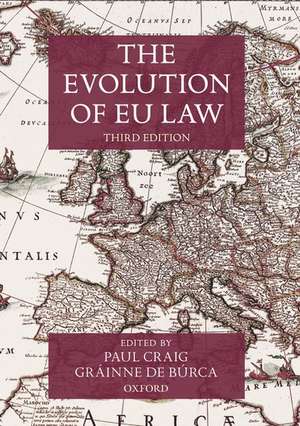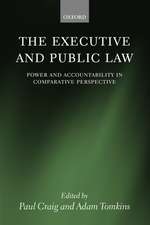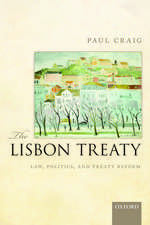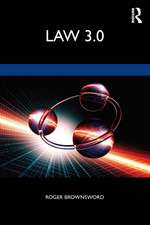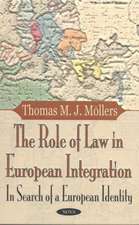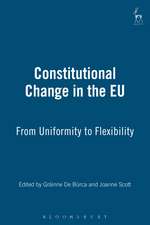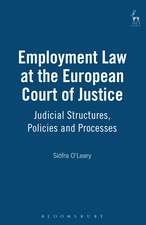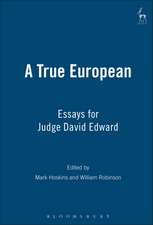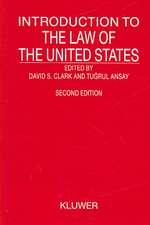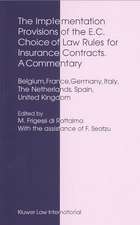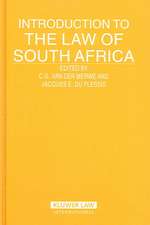The Evolution of EU Law
Editat de Paul Craig, Gráinne de Búrcaen Limba Engleză Paperback – 30 aug 2021
This last decade has been particularly turbulent for the EU. Beset by crises - the financial crisis, the rule of law crisis, the migration crisis, Brexit, and the pandemic - European Law has had to adapt and change in a way not previously seen. First published in 1999, the goal then was to reflect on the important developments that had been made since the creation of the EEC. That goal has not changed. From EU Administrative Law through to the Regulation of Network Industries, each chapter in this seminal work assess the legal and political forces that have shaped the evolution of EU law.With new chapters covering the Rule of Law, Judicial Reform, Brexit, Constitutional and Legal Theory, Refugee and Asylum law, and Data Governance, this third edition of The Evolution of EU Law is a must read for any student or academic of EU law.
| Toate formatele și edițiile | Preț | Express |
|---|---|---|
| Paperback (1) | 379.22 lei 10-16 zile | +97.65 lei 7-13 zile |
| OUP OXFORD – 30 aug 2021 | 379.22 lei 10-16 zile | +97.65 lei 7-13 zile |
| Hardback (1) | 1015.84 lei 31-37 zile | |
| OUP OXFORD – 30 aug 2021 | 1015.84 lei 31-37 zile |
Preț: 379.22 lei
Preț vechi: 451.67 lei
-16% Nou
72.56€ • 75.76$ • 60.06£
Carte disponibilă
Livrare economică 04-10 martie
Livrare express 01-07 martie pentru 107.64 lei
Specificații
ISBN-10: 0192846566
Pagini: 1072
Dimensiuni: 170 x 246 x 50 mm
Greutate: 1.6 kg
Ediția:3
Editura: OUP OXFORD
Colecția OUP Oxford
Locul publicării:Oxford, United Kingdom
Recenzii
This book is a logical – and almost necessary – "further reading" for anybody educated in EU law by Paul Craig and Gráinne De Búrca's widely-used textbook. Seasoned practitioners and academics should read it as well, however, as it provides an authoritative guide to the discipline, which has evolved dramatically since the previous edition was published. All crises and challenges to the EU and its legal order are covered, together with more traditional topics concerning the key areas of EU law. Written by a balanced mix of theory- and practice-oriented scholars, of both the younger and older generation, this book will continue to be a standard reference point for anybody who wants to understand EU law.
This important collection of essays on the continuing 'evolution' of EU law reaches us at a time of intensive reflection on the European Union. The ambition of the book reflects both the extraordinary span of EU legal development over the past decade and the challenging wider context within which it has happened, imprinted with the urgency produced by recurring instances of crisis. Each contribution provides, on its own, rich coverage of and insights into specific sectors or themes. Cohering all of these perspectives within one resource is the editors' impressive achievement.
This long-awaited third edition comes at a critical time for the European Union and EU law scholarship: never has a historical and evolutionary perspective been more important in explaining the origins and purposes of the Union as well as where the Union is and ought to be going. The "Evolution of EU Law" here offers an invaluable compass that masterfully guides its readers through the deep and often tumultuous waters of the Union's constitutional and substantive law.
Review from previous edition This is a serious, comprehensive exploration of the understanding of EU law as it has developed.
...an excellent collection of strong and thought-provoking contributions...an extremely accessible account of the story of EU law.
Notă biografică
Paul Craig is Emeritus Professor of English Law, St John's College, Oxford. His research and writing focusses on Constitutional Law, Administrative Law, EU Law and Comparative Public Law. He has given evidence before select committees on a number of occasions and was the UK Alternate Member of the Venice Commission from 2011-2019.Gráinne de Búrca is Florence Ellinwood Allen Professor of Law, New York University. Her research and teaching focusses primarily on European Union law, international organizations, and international human rights law. She is a co-editor of The International Journal of Constitutional Law and co-director of the Jean Monnet Center at NYU Law school, as well as Director of NYU's Hauser Global Law Program.
